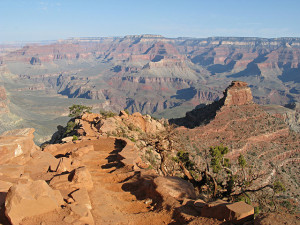
Grand Canyon National Park
Last year, we came up with a one-word difference between liberals and conservatives. That one word was “Believe,” as in, “I don’t believe in climate change despite what those 97 percent of scientists say.” Basically, conservatives often use “believe” in a blind faith kind of way, whereas liberals often use “believe” to validate something that is backed up by facts and evidence. We have now identified a second word that, when you hear it being used, also gives you a major clue as to whether the person saying it is a liberal or a conservative:
That word is “Public.” For liberals, the word “public” is often used in a political context to mean something that is beneficial to everyone, or at least a large number of people. This includes:
Public health — we have seen this concept played out in recent years, for example, with vaccines and guns.
Public safety — again, guns are a public safety issue for liberals. Ditto for transportation-related issues, such as seat belts, airbags and speed limits for cars and trucks. Moreover, the Federal Emergency Management Agency (FEMA), a public safety agency, is sometimes treated very differently by liberals and conservatives. See, for example, Hurricane Katrina versus Hurricane Sandy.
Public lands — the fights at the Bundy ranch in Nevada and the Malheur National Wildlife Refuge in Oregon were over public lands. The conservatives involved in these fights, and many other conservatives, want to freely use or privatize many acres of public lands, especially in the western United States. Such privatization and anti-expansion efforts even include our national parks. Liberals, in contrast, recognize the value of preserving public lands for everyone’s benefit and/or enjoyment, to sustain iconic American wildlife, etc.
Public schools — conservatives have fought to privatize our public schools in different ways, including vouchers for private schools. Liberals, on the other hand, generally believe in a strong public education system as a bedrock for economic advancement. For example, U.S. Senator and presidential candidate Bernie Sanders wants to have free tuition at U.S. public colleges and universities. Sanders’ competitor, Hillary Clinton, believes in providing a high-quality education to every child in the U.S., regardless of zip code.
Public libraries — liberals view public libraries as valuable resources for kids who are not well-off to read books, get high-speed Internet access, etc. Conservatives seem to view public libraries as places to cut funding.
Public transportation — it’s difficult to find a liberal who doesn’t like public transportation, including high-speed rail service, as an efficient alternative to our crowded roads and automobile pollution. More liberal cities like San Francisco and Portland are renowned for their transportation systems. And New York City residents swear by their subways even after more than 100 years. In contrast, conservatives want to cut government spending on public transportation, such as Amtrak (a public/private partnership) and high-speed rail projects.
There are many other uses of “public,” such as “public works,” “public parks” and “public interest.” As indicated above, however, conservatives don’t seem to use the word “public” much. On the contrary, conservatives sure do love its opposite, “private,” and its offshoots, “privatize” and “privatization.” Conservatives want to privatize many government functions, including the U.S. Postal Service, Social Security, the Veterans Administration and even the Internal Revenue Service.
As the fundamental liberal/conservative debate over the role of government continues, look for use of the word “public” to help identify who’s who.
Photo by John Loo, used under Creative Commons license. http://is.gd/PximNO


